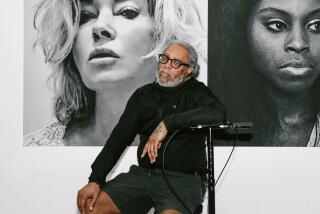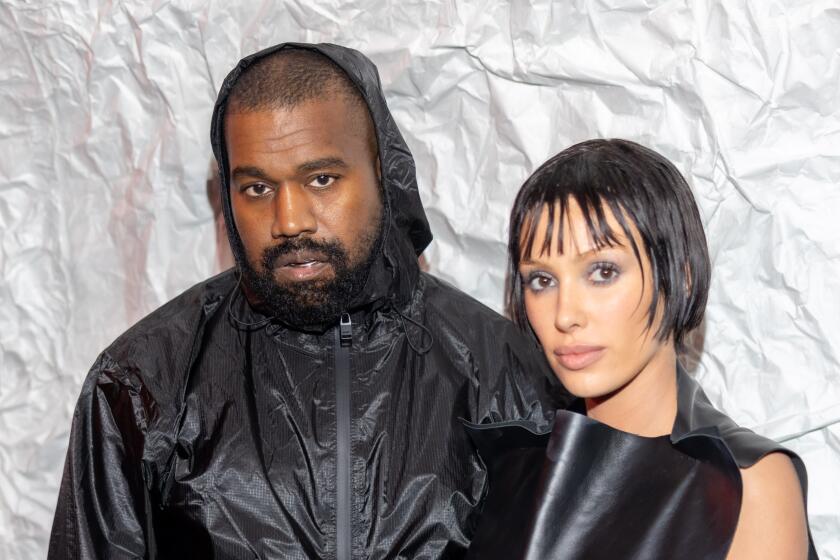Q&A: Strokes’ Albert Hammond Jr. talks philosophy behind new solo album
Albert Hammond Jr., best known for his steady rhythm guitar work as a member of The Strokes, prepared for his first solo album since 2008’s “¿Cómo Te Llama?” in a manner seemingly contradictory to the image of his stylishly rumpled garage band: by philosophizing.
After getting sober five years ago and putting out the EP “AHJ” in 2013, Hammond read Carl Jung, Joseph Campbell and Carl Sagan, among others, to rethink the self and its relationship to the world.
In anticipation of Friday’s release of his third LP, “Momentary Masters,” Hammond spoke with The Times about the album’s stimuli, his Ingmar Bergman-inspired music video and writing with melody as a guitarist and vocalist.
SIGN UP for the free Great Reads newsletter >>
Your new album, “Momentary Masters,” features a renewed sober mindset, and you’ve talked about coming to terms with the light and dark aspects of the self. How long did it take you to put that into practice?
I don’t know if I’ve even fully grasped a lot of things yet. When I speak of things, it’s more my discovery of them and my curiosity of them. My mind and my thoughts can change frequently, and I’m OK with that.
When I was going to therapy, we had this conversation, the therapist and I, about that, and I started reading Joseph Campbell and Carl Jung and they speak a lot about it. I just got interested in that idea of a complete person in that you always have two different sides from when you grow up. You have one side you show people and one side you don’t. I was just curious about where that would lead me.
Did music play a role in getting sober and discovering these new ways of looking at life? Or was it more the music that was affected by these personal changes?
It got to a point where the music was being affected negatively by my actions in life. And then it got to a point where it affected it positively, but I think it’s a back-and-forth. I had to rediscover a curiosity in having fun, and in doing that, I rediscovered my instrument and writing again.
The beginning of the “Losing Touch” recreates the intro to “The Seventh Seal” chess game between Death and the protagonist. Do you think you could beat Death in a game of chess?
I never really thought about it. I think that’s the whole point is that you can’t beat [Death]. He’s allowing you the hope that you can, so it’s kind of like that’s your extended time.
“Momentary Masters” includes a cover of Bob Dylan’s “Don’t Think Twice, It’s All Right.” What about the Dylan song drew you to cover it, and how did you go about making it an Albert Hammond Jr. song?
The hardest thing with covering any song, but especially a Dylan song, is being able to sing it in your way but at the same time keeping some similarities. I was looking for a song I could arrange in a modern way. And when that one came on, I heard that beat and I started creating different melodies around it during all the harmonica parts. When I found the right vocal phrasing, it was kind of exciting and created its own meaning for me. And then it fit perfectly on the record as a palate cleanser between side A and side B ... to reset the ears.
This is your first studio album to feature your touring band. How did it affect the songwriting or recording?
It’s the reason why I made it and what sparked my excitement. I got really excited at how we were playing new songs and old songs, and I had these demo songs. I was curious to see what we would do with new material. We get along in so many different ways. As we were figuring out how to work together, we started creating stuff that just excited us all.
With the album title based off Carl Sagan’s “Pale Blue Dot” speech, are you attempting to become a “momentary master,” or do you see it as a folly to try to master anything?
I definitely took that whole speech as the idea that there’s no meaning in the world, and we create our own meaning. But it’s kind of perfect because that then allows for our fallibility ... that makes the world an active existence. But I guess I was discussing it in many ways. There was something inspiring to my ego, where I felt like I had achieved something like that. But it immediately goes away because then you have a new goal.
There are these oxymoronic sentiments on the song “Power Hungry.” How do these lyrics, and language in general, affect the stories you tell?
There is meaning to everything I’m saying. I know for “Exits, you are just another entry,” the reason I said it is because there’s a name for something and a lot of times people just take it for what the name is. It might not have to just be that. There are other doors, other possibilities, so leaving something should also be the beginning of something else.
But just the fact that both things exist at the same time is what the black and the white part of the record was. You are the good and bad version of you at the same time. It’s not like you can throw away the bad version of you or it only comes out when you’re sad. It’s right next to you all the time.
A song like “In Transit,” off your first record, has this lullaby sonic quality to it, but based on the lyrics and what you were going through, it wasn’t written at a very peaceful time. What’s it like to look back at that song, and how does your relationship with the song change?
I like creating melody, and sometimes the melody is sweet but what you’re feeling is something else. It creates this duality. You can listen to things two ways. I feel like even with this album, you can put it on and have a good time. And then there’ll be different layers with the thoughts I was thinking.
My first album was just trying to get out of my apartment. Even for how arranged it is, it still has a very personal feeling to it. And then the second one was trying to escape it. With “Momentary Masters,” I was coming off this [“AHJ”] EP, and I was missing an album to tie all this stuff together. And I wanted something to divide that line where I could express myself lyrically, where I felt the best melodically, but also have a record that was fun.
Hammond Jr. will perform at the Observatory in Santa Ana on Oct. 13 and at the Teragram Ballroom in Los Angeles on Oct. 14.
MORE:
Sam Smith, Kanye West top 2015 iHeartRadio Festival lineup
HBO will air Paris concert and documentary on U2 world tour
Former One Direction singer Zayn Malik signs solo deal with RCA
More to Read
The biggest entertainment stories
Get our big stories about Hollywood, film, television, music, arts, culture and more right in your inbox as soon as they publish.
You may occasionally receive promotional content from the Los Angeles Times.






